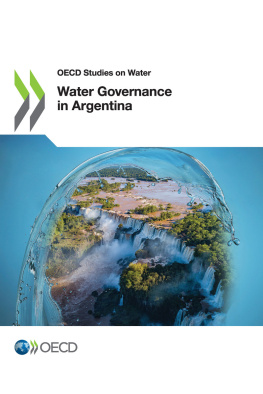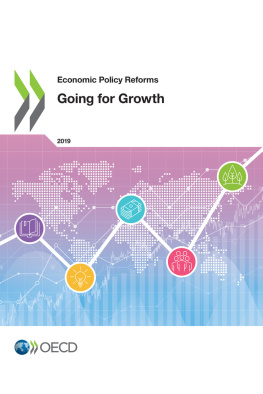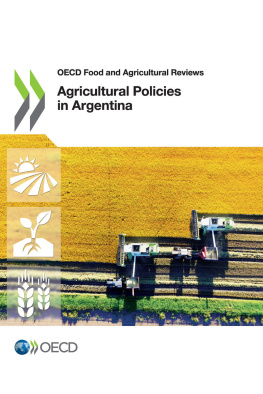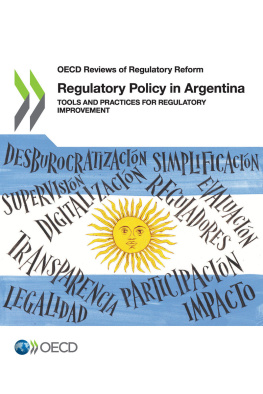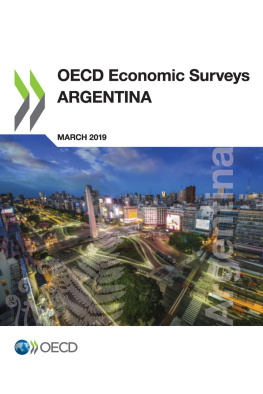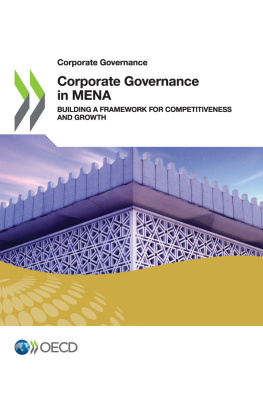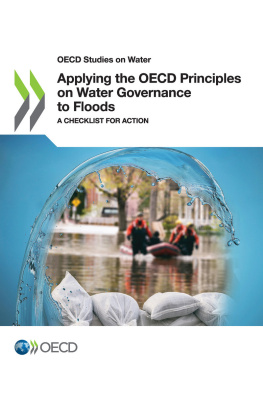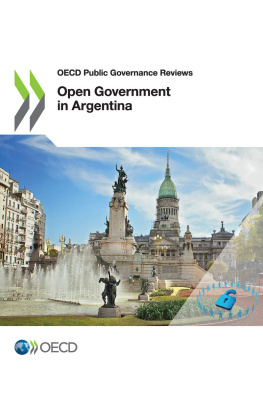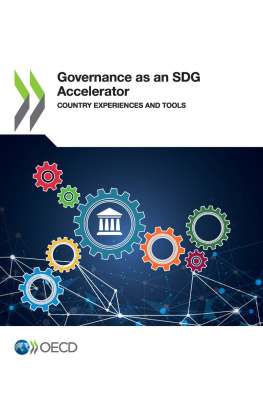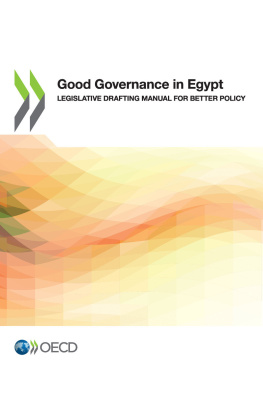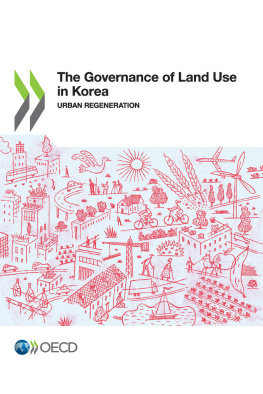OECD - Water Governance in Argentina
Here you can read online OECD - Water Governance in Argentina full text of the book (entire story) in english for free. Download pdf and epub, get meaning, cover and reviews about this ebook. year: 2019, publisher: OECD Publishing, genre: Politics. Description of the work, (preface) as well as reviews are available. Best literature library LitArk.com created for fans of good reading and offers a wide selection of genres:
Romance novel
Science fiction
Adventure
Detective
Science
History
Home and family
Prose
Art
Politics
Computer
Non-fiction
Religion
Business
Children
Humor
Choose a favorite category and find really read worthwhile books. Enjoy immersion in the world of imagination, feel the emotions of the characters or learn something new for yourself, make an fascinating discovery.
Water Governance in Argentina: summary, description and annotation
We offer to read an annotation, description, summary or preface (depends on what the author of the book "Water Governance in Argentina" wrote himself). If you haven't found the necessary information about the book — write in the comments, we will try to find it.
OECD: author's other books
Who wrote Water Governance in Argentina? Find out the surname, the name of the author of the book and a list of all author's works by series.
Water Governance in Argentina — read online for free the complete book (whole text) full work
Below is the text of the book, divided by pages. System saving the place of the last page read, allows you to conveniently read the book "Water Governance in Argentina" online for free, without having to search again every time where you left off. Put a bookmark, and you can go to the page where you finished reading at any time.
Font size:
Interval:
Bookmark:
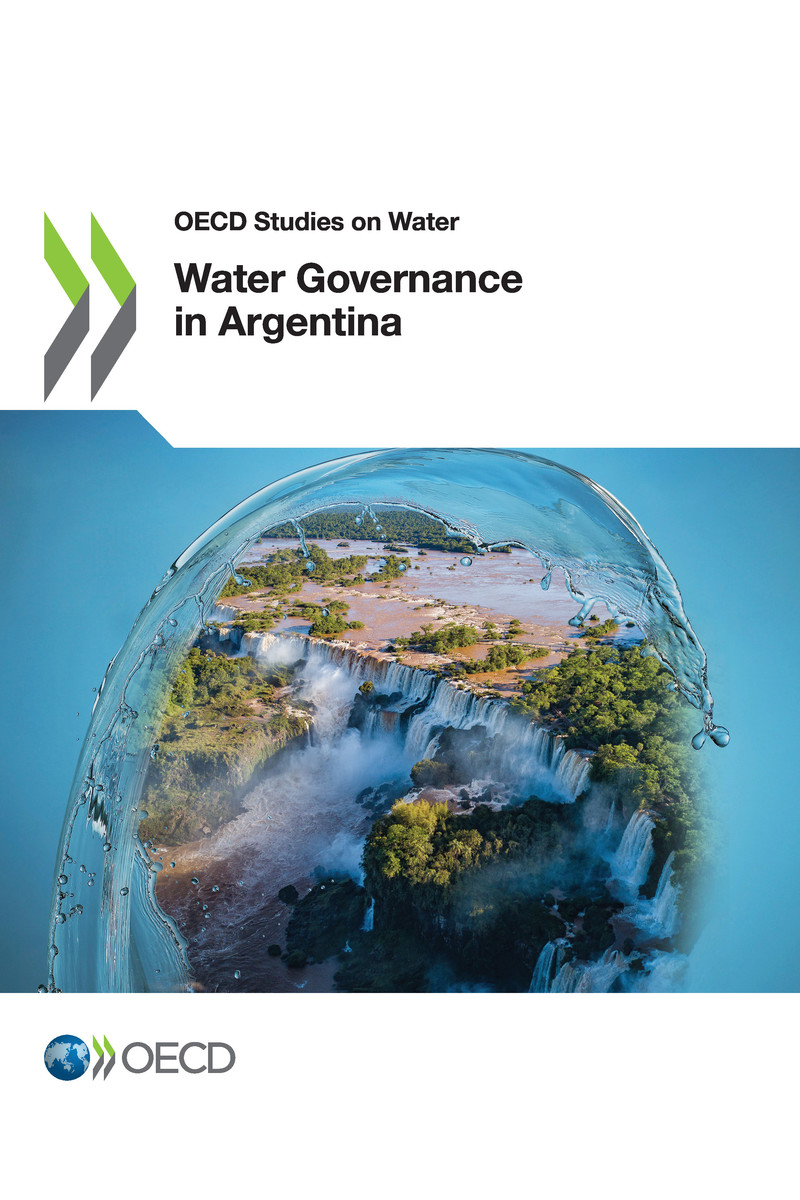
OECD (2019), Water Governance in Argentina , OECD Studies on Water, OECD Publishing, Paris, https://doi.org/10.1787/bc9ccbf6-en .
Ensuring long-term water security is essential in the pathway towards climate change adaptation, inclusive growth and sustainable development in Argentina. In a country with such a large territorial and hydrological diversity, managing water risks and ensuring universal access to drinking water and sanitation, requires effective multi-level governance and planning. The macroeconomic context as well as key megatrends related to climate, demography and urbanisation pose serious challenges to current and future water availability and demand. But they also provide a unique opportunity to set the right incentives towards greater water use efficiency and to transition from crisis to risk management, in a shared responsibility across local, basin, state and national levels.
Over the past year, the national Secretary of Infrastructure and Water Policy of the Ministry of Interior, Public Works and Housing of Argentina and the OECD, in co-operation with the Inter-American Development Bank (IDB), have engaged a multi-stakeholder dialogue to assess the strengths and weaknesses of Argentinas water governance against the OECD Principles on Water Governance , and to enhance national and provincial capacity to deliver effective, efficient, and inclusive water policies. This policy dialogue involved over 200 representatives from public, private and non-profit sectors (Annex A). It was based on a robust data collection process and benefited from peer-reviewers from Australia, Brazil, the Netherlands, Spain and the United States. The report Water Governance in Argentina summarises the key findings and recommendations from this dialogue. It includes an evidence-based analysis of the multi-level governance, basin management and economic regulation of the sector. In addition, four case studies depict the distinctive challenges faced at basin, metropolitan and provincial scale to manage water resources (Mendoza and the Inter jurisdictional Authority of the Limay, Neuquen and Negro River Basin) and deliver water services (Metropolitan Area of Buenos Aires and Santa Fe) in Argentina.
Water policy has recently gained higher profile in Argentinas national agenda, especially after the launch of an ambitious National Water Plan in 2016 aiming for water resilience, climate change adaptation and universal access to water services, and the creation of a dedicated Secretary of Infrastructure and Water Policy. Moving forward, the report identifies three areas of action to make water policies fit for the future: i) a stronger multi-level governance system that reconciles national and provincial priorities; ii) a more functional approach aligning administrative and hydrological boundaries to manage water at the right scale; and iii) an effective regulatory framework to provide better quality water services. With such actions, Argentina will be equipped to design and implement better water policies for better lives.

Pablo J. Bereciartua
Secretary of Infrastructure and Water Policy, Argentina

Lamia Kamal-Chaoui
Director, OECD Centre for Entrepreneurship, SMEs, Regions and Cities
Over the past decade, the OECD has accompanied several countries in their efforts to reform water policies as a means to achieve sustainable growth and development. The demand-driven national Water Policy Dialogues help governments at all levels set the water agenda and facilitate ambitious policy reform in a shared responsibility with stakeholders by:
Assessing a countrys performance in terms of designing and implementing water policies, and identifying key pressing and emerging challenges.
Engaging in a constructive and collaborative dialogue with stakeholders to identify the key issues and build consensus on potential ways forward.
Providing a clear menu of options for reform, building on international good practice and a robust analysis of the specific characteristics in the country.
Establishing a realistic action plan, grounded in multi-stakeholder policy discussions, and laying down short, medium and long-term measures; and
Initiating momentum for change that derives from political buy-in acquired in the data collection, analysis, and consultation phases.
The OECD carried out such national policy dialogues in countries such as Mexico, the Netherlands, Brazil, Korea, Jordan, Tunisia, and currently in Peru, focusing on various elements of water policy reform, including multi-level governance, regulation, financing and pricing, water allocation, basin management and private sector participation. In all these countries, the OECD independent and external view, as well as the high-level political leadership and commitment have provided impetus for change and improvement.
This national Policy Dialogue with Argentina is a valuable addition to this series. It assesses whether current water governance systems are functioning optimally in the country and provides policy advice to adjust them where needed. It also holds much potential for concrete follow-up and implementation thanks to the fruitful collaboration with the IDB throughout the process, which provides avenues for mainstreaming the reports recommendations in future technical assistance with Argentina.
Font size:
Interval:
Bookmark:
Similar books «Water Governance in Argentina»
Look at similar books to Water Governance in Argentina. We have selected literature similar in name and meaning in the hope of providing readers with more options to find new, interesting, not yet read works.
Discussion, reviews of the book Water Governance in Argentina and just readers' own opinions. Leave your comments, write what you think about the work, its meaning or the main characters. Specify what exactly you liked and what you didn't like, and why you think so.

